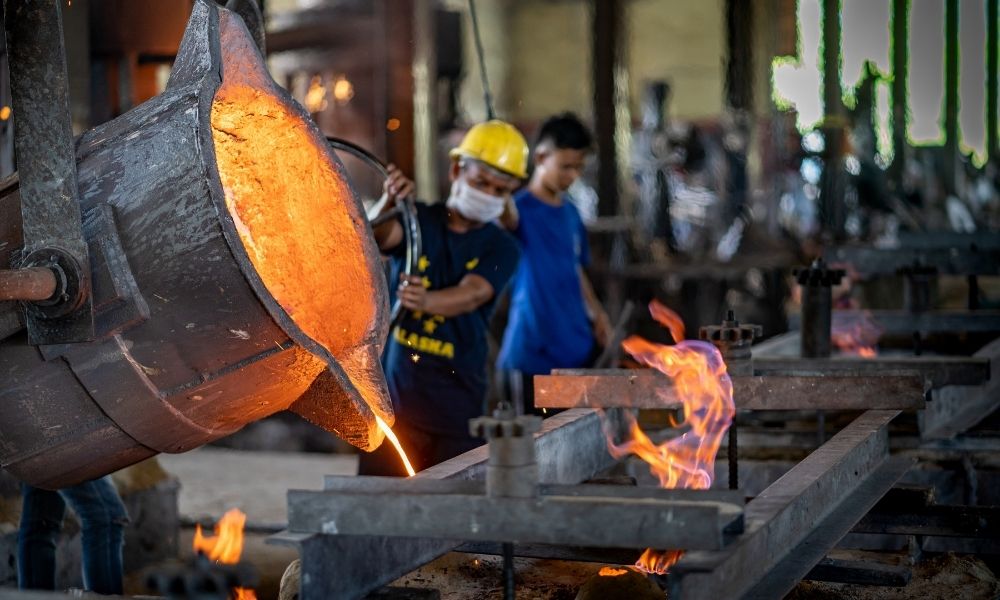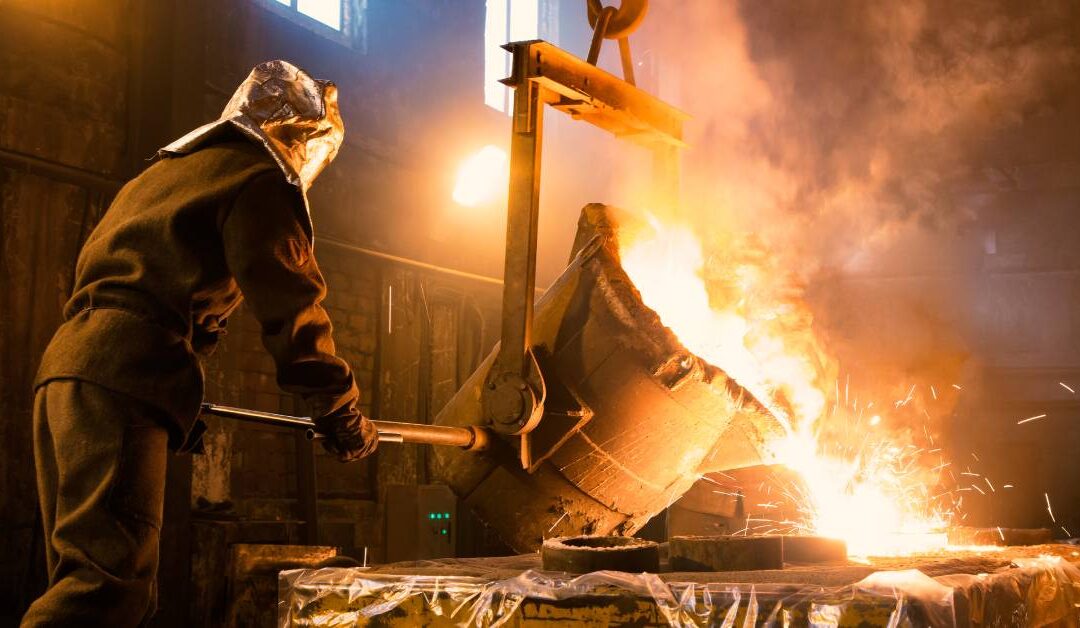Discover the Diverse Services Given by Metal Foundries in Todays Market
Steel shops play a crucial duty in contemporary manufacturing by offering a variety of services customized to fulfill industrial demands. They utilize methods like sand casting and accuracy machining to produce intricate parts. Custom-made alloy growth even more boosts product efficiency. However, quality assurance and sustainability are increasingly becoming prime focus in the industry. Understanding these varied services discloses the significant impact shops have on production efficiency and ecological duty. What else might be affecting their evolution?
Steel Spreading Techniques: A Summary
Steel casting strategies embody a mix of virtuosity and design, changing liquified metal into accurate forms and forms. These techniques have actually developed over centuries, adjusting to technological advancements and the diverse needs of various sectors. Among one of the most typical strategies are sand spreading, which uses sand mold and mildews; financial investment casting, known for its complex designs; and die spreading, which employs high stress for rapid production.
Each method provides one-of-a-kind benefits, such as price effectiveness, accuracy, and the ability to function with various metal types. Sand casting is particularly preferred for its versatility and ease of usage, whereas investment spreading succeeds in generating in-depth parts. Die spreading, on the other hand, is suitable for high-volume production, guaranteeing harmony and fast turn-around. Jointly, these methods play a vital duty in producing elements for automotive, aerospace, and machinery industries, showcasing the complex relationship in between style and functionality in metalworking.

Precision Machining Provider
Precision machining solutions deliver high accuracy and uniformity in the manufacture of intricate parts across different industries - Aluminum Foundry. These solutions are important for generating components that require detailed designs and limited resistances, ensuring that they satisfy stringent high quality criteria. Advanced machining methods, including CNC milling, transforming, and grinding, allow metal foundries to create elements with exceptional information and surface
Using cutting edge machinery, precision machining can deal with a variety of materials, including composites, plastics, and steels. This flexibility enables industries such as aerospace, automobile, and clinical to gain from tailored options that improve product efficiency and reliability.

Custom-made Alloy Growth
Custom alloy growth plays a vital role in meeting the specific requirements of various commercial applications. Steel shops take part in developing customized alloys that satisfy unique efficiency standards, such as strength, rust resistance, and thermal conductivity. By making use of advanced metallurgical techniques and simulations, these shops can create alloys that boost the general functionality of items across varied fields, including aerospace, auto, and electronics.
Collaboration in between foundries and clients is substantial in this procedure. Designers and metallurgists interact to determine preferred residential properties, enabling for exact changes in make-up and processing techniques. This bespoke approach not just maximizes product efficiency however likewise adds to cost performance by reducing waste and making the most of source use.
In the affordable landscape of contemporary production, custom alloy advancement is a crucial solution that encourages services to innovate and maintain an one-upmanship while addressing particular operational difficulties effectively.
Quality Control and Testing Procedures
Ensuring the greatest standards of quality assurance and testing procedures is essential for steel shops to deliver reputable products. These treatments typically incorporate a series of methodologies designed to assess the integrity and performance of steel spreadings. Factories employ different screening methods, including visual evaluations, mechanical building assessments, and non-destructive testing techniques such as ultrasonic and radiographic assessments.
Product structure is carefully analyzed making use of spectrometric techniques to validate adherence to defined alloy criteria. Additionally, thermal evaluation may be carried out to check solidification patterns and predict mechanical homes.
Documentation of each testing stage is crucial, as it gives traceability and assurance that the products satisfy market regulations and customer expectations. By carrying out rigorous quality assurance processes, metal factories not just improve item dependability however likewise foster trust with clients, keeping an one-upmanship in the industry.
Sustainability Practices in Steel Foundries
As sectors significantly focus on environmental responsibility, metal factories are embracing sustainability techniques that decrease their environmental impact. Lots of factories are executing closed-loop systems to recycle materials, minimizing waste and saving resources. This method not only lowers the demand for resources however also lowers power intake throughout manufacturing.
Moreover, some shops are purchasing energy-efficient modern technologies, such as electric furnaces and progressed cooling down systems, which greatly minimize greenhouse gas discharges. Making use of green casting materials and additives additionally improves sustainability by reducing hazardous environmental effects.
Water conservation is another important focus, with factories using recirculation systems to limit water use. Furthermore, waste management methods, including the recycling of sand and metal scrap, are ending up being common technique. By incorporating these sustainability measures, metal foundries are positioning themselves as responsible players in the manufacturing sector, lining up with international initiatives to promote a much more sustainable industrial landscape.
Regularly Asked Questions
What Industries Typically Use Steel Factory Providers?
Numerous sectors make use of steel shop services, consisting of auto, energy, building and construction, and aerospace fields. These markets count on factories for personalized metal elements, casting remedies, and high-grade materials vital for their manufacturing processes and item development.
Exactly How Can I Choose the Right Foundry for My Task?
To pick the right shop, one need to examine factors such as specialization, credibility, innovation, quality control procedures, distribution timelines, and client service. Carrying out comprehensive research and seeking recommendations can better lead the decision-making process.
What Is the Ordinary Preparation for Casting Orders?
The typical lead time for casting orders commonly ranges from four to twelve weeks. Aspects influencing this timeline consist of order intricacy, foundry capacity, and material schedule, which can vary considerably amongst various foundries.
Are Metal Factories Capable of Producing Small Batch Runs?

What Safety And Security Steps Are Implemented in Steel Shops?
Metal factories apply various security procedures, including personal protective devices, air flow systems, regular training, emergency reaction protocols, and strict adherence to security regulations to lessen risks associated with liquified metal handling and work environment crashes.
Metal shops play a crucial role in modern manufacturing by using a selection of services customized to meet industrial needs. Steel shops involve in developing customized alloys that cater to distinct efficiency criteria, such as stamina, corrosion resistance, and thermal conductivity. Making sure the highest possible requirements of top quality control and screening procedures is important for steel foundries to supply trustworthy products. As markets progressively focus on environmental responsibility, metal shops are adopting sustainability techniques that lessen their environmental impact. Various markets utilize steel foundry solutions, including auto, building and construction, energy, and aerospace fields.